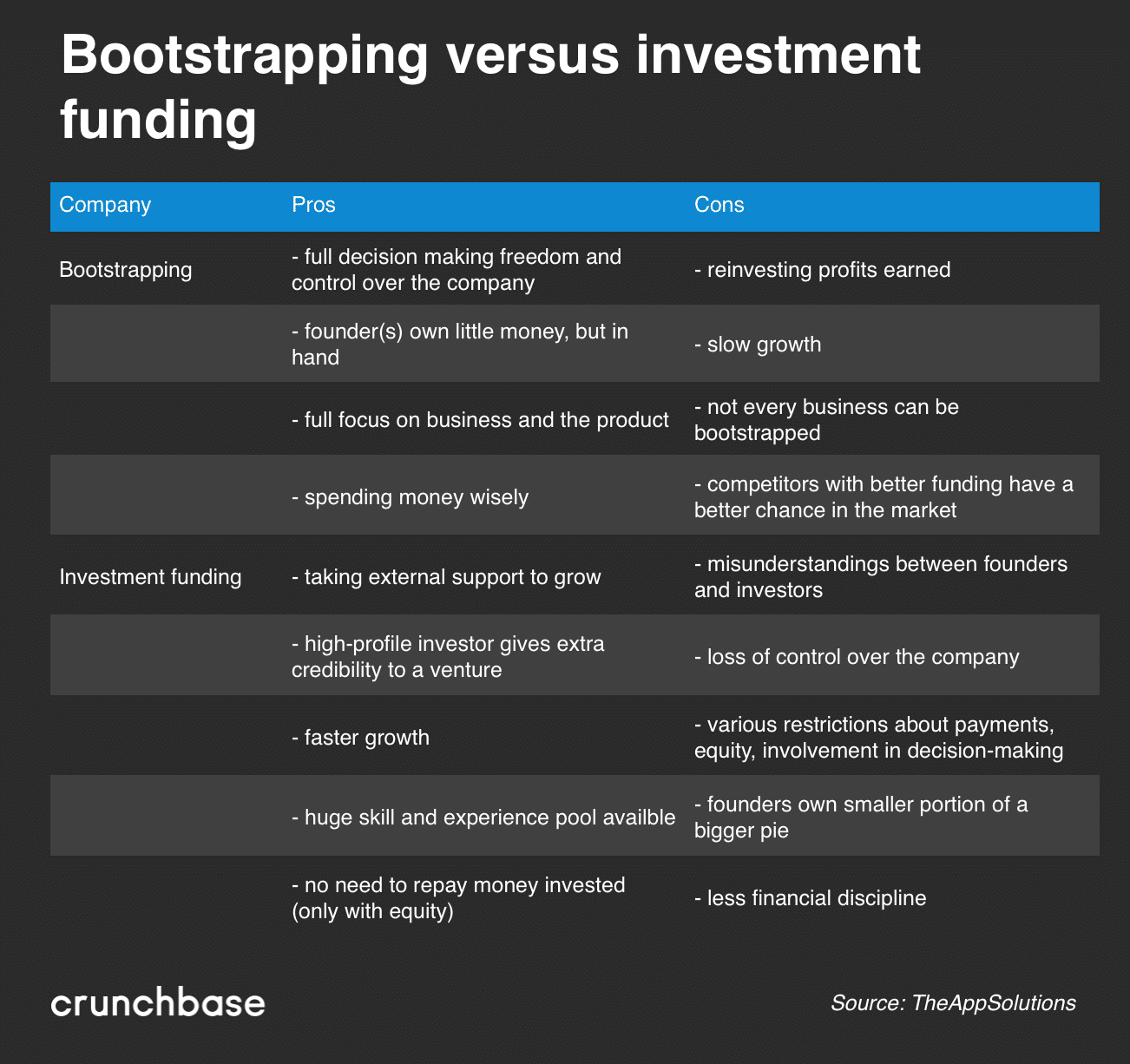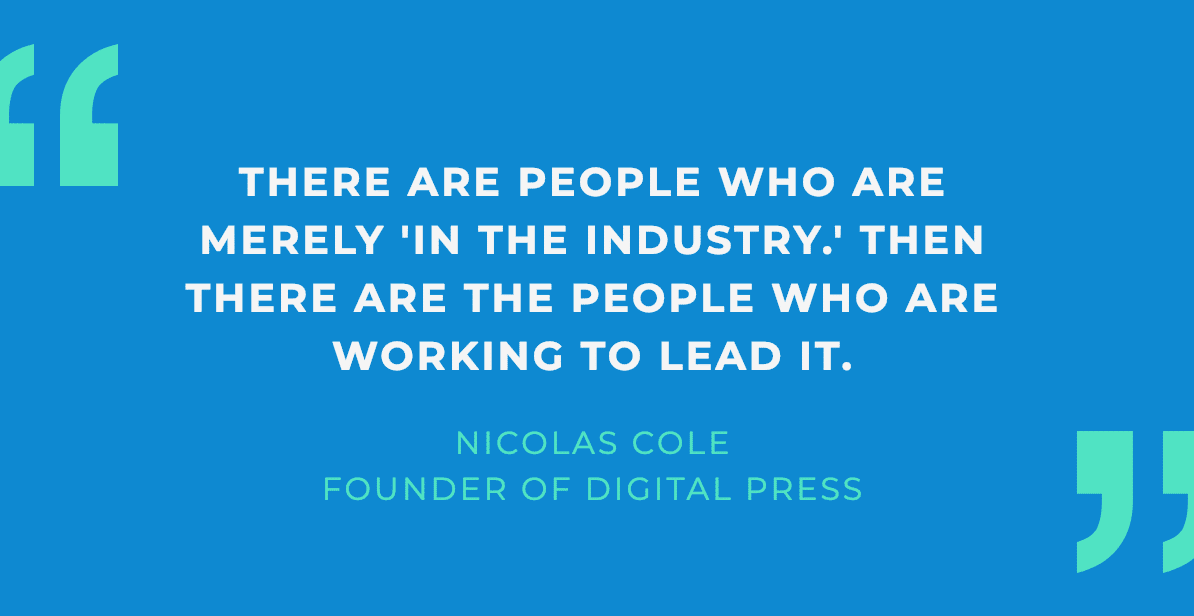So, you’ve decided you want to become an “entrepreneur.”
Maybe the idea came to you during a coffee meeting with a friend. Maybe you were watching TV, suffering through another mindless commercial, when all of a sudden, “it hit you.”
Find the right investors and upgrade to Crunchbase Pro.
Or maybe you were like me, freelancing and already doing something on your own. And building a business was simply the next logical step.

Source: Anthill
As a founder myself, I can now look back on the first few months of my startup journey. I remember certain pivots or forks in the road that had a massive impact on our trajectory as a company.
Moments where had we made a different decision, we would have found ourselves walking down a very different road—maybe one that could have destroyed our business. Of course, at the time it was difficult to know which priorities were “right” and which ones would only waste precious time. But now, it’s easy to see where things went as planned, and where we could have made massive errors.
So that’s what I’d like to share with you today.
5 top priorities as a startup founder
As a startup founder, your job is going to be to make a series of very important decisions, one after another, in order to quickly get your company to where it needs to be. And in order to make these difficult decisions, you’re going to need to get clear on your priorities—and not spend time on unnecessary activities.
These should be your first 5 priorities as a founder:
-
Where is the cash coming from?
Every single business mentor I’ve ever had has said the exact same thing to me: “Cash is king.”
Without cash, whatever road you’re sprinting down as a founder will start to vanish right in front of you. Without cash, you won’t have employees, developers, or business partners. Without cash, you won’t have a product or a scalable service. Without cash, your business is nothing more than an idea in limbo.
For the most part, where your cash is coming from is the result of the type of company you’re looking to build. Some founders go the venture capital route and raise a chunk of cash, giving them a certain period of time to prove the viability of their business—before either closing shop, raising another round, or becoming profitable.
Other founders, like myself, start businesses that generate cash from day one. For example, I run a service company called Digital Press, and we’ve been profitable since our very first client (and actually booked six-figures in annual recurring revenue in our first 30 days of being open for business). This simply isn’t possible for, say, a software platform, or companies. For example, Snapchat required years of venture capital funding in order to stay alive, and Snapchat still isn’t profitable.

Source: Invoice Blog
Understand the business you’re trying to build
So, priority number one: understand which type of business you’re trying to build. Then make sure you know where your cash is coming from.
If it’s from investors, then you should know what metrics you need to hit in order to secure your next round. And if it’s from customers and clients, then you need to make sure you’re keeping them coming in the door.
Which leads to…
-
Build a sales (or user acquisition) machine.
This holds true for any type of company:
If cash is the gasoline that allows your company to run, then your second priority needs to be pumping oil—day and night, day and night.
The day we pushed our company website live, and I changed all my bios to “Founder of Digital Press.” My co-founder and I got to work building a process for attracting new clients (and truthfully, he deserves the majority of the credit).
We thought hard about who we were selling to, what pain points they might be experiencing. Finally, we’d consider how we could get on the phone with them to explain the benefits of our unique approach to content marketing.
Had we not done this, we would have sat there waiting for someone to find our website, and then take it upon themselves to contact us. And that’s never a position you want to be in.
How to get in front of the right audience
Now, a lot of founders think a “sales machine” means having your friend post about your “new company” on Facebook. Or they think it’s about Tweeting constantly: “Looking for a new website? Send us an email!” But these aren’t the things that are going to drive sales for your company.
What you need is to get right in front of the people you’re selling to. You need to think about what’s going to move them to make the decision to work with you. You need to get them on the phone. You need to hear their buying hesitancies. You need to come up with clear responses. You need to really dig into the process of converting distant observers into paying customers.
Let me tell you the easiest way to do that.
-
Invest in building your personal brand as a founder.
The single most valuable investment I’ve ever made as an entrepreneur has been in myself and my own personal brand.
This is something founders of companies, C-suite executives, even investors and venture capitalists are starting to realize can have a massive impact on the trajectory of a business. When the founder is a prominent figure in their industry, when the founder speaks regularly on the space as a whole, and when they willingly share their expertise, everything moves faster.
As soon as the founder is positioned as an authority and a thought leader, they get invited to speak at conferences. They get invited to appear on podcasts. They get invited to private events, to contribute columns to major publications—who they “are” becomes an inbound machine.
Building yourself up as a thought leader
I’ve been helping founders and executive teams build themselves into industry thought leaders for years. And I can tell you first-hand that building my own personal brand as a founder has moved the needle more for my business than any other marketing method, period. It’s the difference between running ads and creating long-term assets.
There are people who are merely “in the industry.” Then there are the people who are working to lead it. And it’s the thing that makes every other marketing effort ten times more effective.

Someone searches your name into Google and immediately gets the sense you’re actively pushing the boundaries of your industry.
That’s the ROI.
-
Learn everything you can from your first customers.
Clients, customers, users—whoever it is you’re attracting, it’s your job to learn as much as you can from them, as early (and as frequently) as possible.
As soon as you start to grow as a company, this learning process will become harder. You’ll have more responsibilities to juggle; hiring alone eats up a massive amount of time. So, while it’s still you and your co-founder, or your first few employees, take it upon yourself to talk to your clients, customers, or users directly. Ask for feedback. Change the way things are done and see if you get different results. Say, “We’re beta-testing a new service, mind if we give it a shot with you? Free of charge, of course.” Learn, learn, learn.
The reason why I’m emphasizing this as such a priority is that there are so many founders who “think” they know what their customers or clients or users want.
They walk into their business idea with a preconceived notion of how things are going to go, unprepared for the inevitable (and often times uncomfortable) realization that people want something else.
And then where founders go wrong is they think to themselves, “No, our idea is correct, people just don’t get it.” But businesses aren’t built off great ideas. They’re built around solving people’s problems with elegant solutions.
So, get out there, and ask your customers to tell you about their problems.
-
Get in the habit of taking care of yourself.
This last priority is arguably the most important one, and ironically, a rarely discussed aspect of entrepreneurship.
As soon as your business starts to gain some traction, you’re going to experience an unparalleled level of stress as a startup founder. You thought college finals were hard? You thought hockey practices in high school wore you out? Entrepreneurship is one of the most demanding pursuits in the entire world. And no, I don’t mean running a Shopify store part-time.
As soon as you’ve got full-time employees, and health care, and an HR department, and employee reviews, and dozens upon dozens of clients. And you’re doing your own marketing. And you’re trying to scale. And you’re trying to fix what you’ve already got in place. And every day’s To Do list just keeps going and going…
Trust me when I say that “taking care of yourself” needs to be at the top of your priority list.
There was a point during our own scaling journey where I had a really hard time with this. We were hiring 2-3 new full-time employees every 30 days. We were onboarding 2-3 new clients every single week. And I was working 14 hours per day, waking up at 7:00 a.m. to a barrage of Slack messages from my co-founder (on east coast time). Then sitting in my desk chair until 7:00 p.m., before making a quick dinner, trying to relax for an hour. Finally, I’d work until midnight and repeating the cycle over again.
3 months of this, and I ended up in the emergency room with shingles.
Now, looking back, I can see how much I perpetuated that cycle. I often sat at my computer looking for problems to fix—just like any other devoted founder. But the problem is, that sort of behavior isn’t sustainable. There’s a line between “doing what needs to get done” and being irresponsible with your own health. And I had to learn that one the hard way.
Which is why I strongly encourage all new founders to get in the habit of taking care of themselves from the very beginning. Because trust me, the faster you grow, and the bigger your company becomes, the easier it gets to put everyone else before yourself.
Start practicing now.
Nicolas Cole is the founder of Digital Press, a content marketing agency that turns founders, executives, and entrepreneurs into world-renowned thought leaders. As an author, Cole is a 4x Top Writer on Quora and Top 30 Columnist for Inc Magazine with over 50 million views on his work. His writing has appeared in TIME, Forbes, Fortune, Business Insider, CNBC, The Chicago Tribune, and more.






